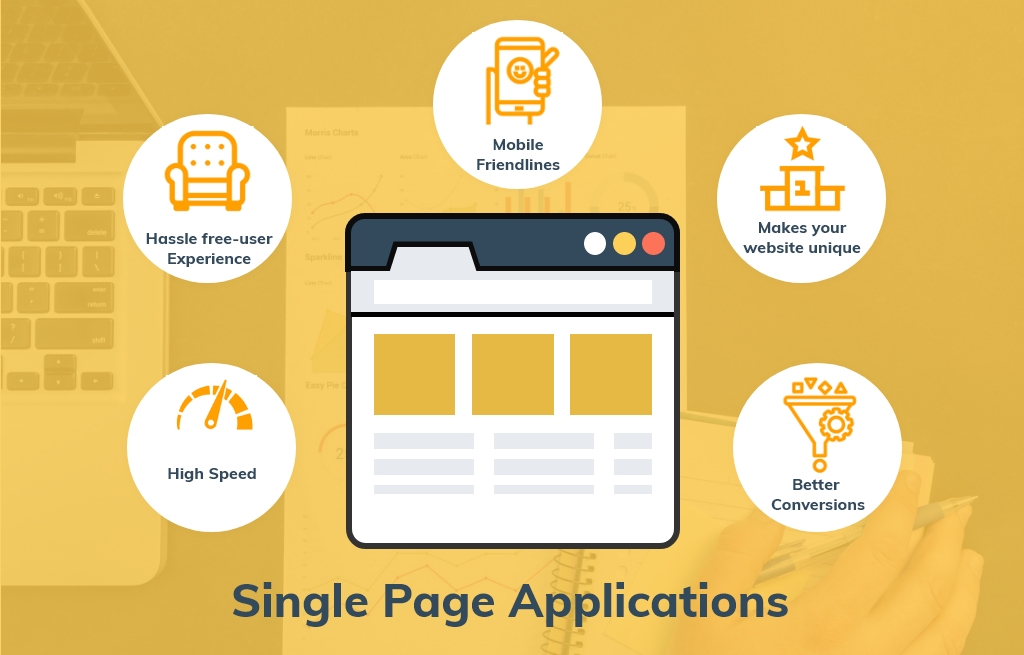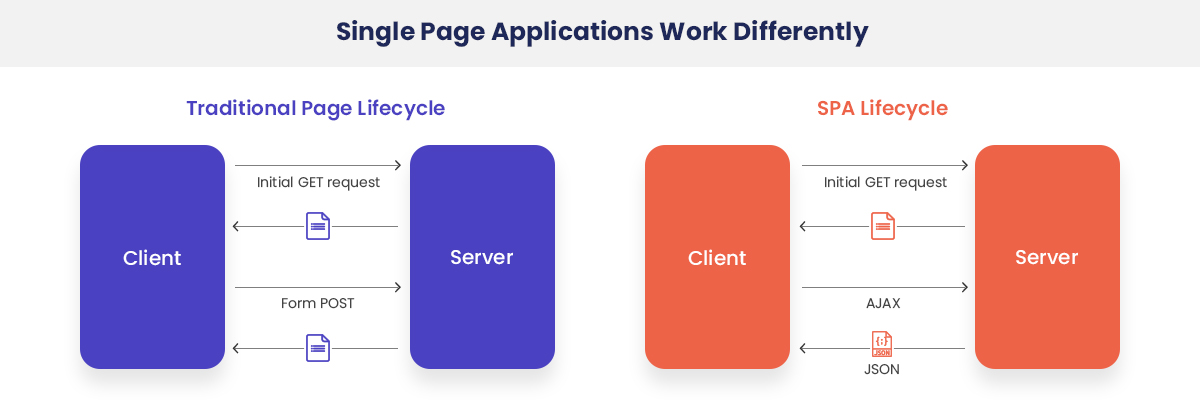The customer is king and the brand’s prime focus in this digital world. Even the most successful brands only focus on staying customer-centric strategies to offer their customers the best possible user experience. And why not? Because it takes users only 0.5 seconds to form a perception about a brand with the app or website you are presenting to them.
Businesses are desperately trying to enhance the user experience and generate higher conversion rates. Single-page applications come to the rescue to cater to all these constantly growing customer demands. Big brands like Facebook, Instagram, and Trello are the perfect examples of single-page applications.
Yes, you read it right! Our daily doses of the internet are all single-page applications. These apps are faster, more responsive, and easier to main than the other applications. You’ll get myriad benefits when developing a single page application in terms of performance, flexibility, and more.
Keep reading this blog and find out the top benefits of developing a single-page application for your business.
Top Benefits Of Single Page App Development:
✅Provide Smooth Interaction With The User
Single-page applications significantly improve the user experience by eliminating the problem of page reloading. The app runs inside the browser and creates a more natural and native-like environment.
We can say that SPAs load a single file and then appear on it through navigation. Here only essential functions of the application load at a time rather than the entire page.
For instance, Google Maps constantly reload when you enter new information and search different parts, making for a very different, significantly less fluid UX. With SPA web architecture, users have a streamlined, natural interaction with the page, which is a crucial goal of UX optimization.
✅Increased Website Speed
A single-page application avoids putting pressure on the server. In contrast, a traditional website often faces the problem of reduced speed with the constant need for page reloading.
The SPA can reload only the specific entities that the user needs, making the app more functional and providing an efficient user experience. It’s beneficial for business websites, considering the speed and the UX’s vital element as it profoundly affects abandonment and conversion rates.
✅Offline Support & Caching
Another significant advantage of SPA is that it works offline too with offline data caching system. SPAs can store the data received after getting a request from the local server. Thus, there is no need to stay online to run the application. It can function later in case of connectivity issues. This exclusive feature is missing in the multi-page applications, making SPAs automatically better choice than other application types.
✅Flexible UI Design
Single-page applications support rich interaction and enable implementation of different elements in a single page with varied intermediate states like selections, menus, etc. It becomes an extremely valuable feature for user experience optimization and creating flexible user interfaces.
✅Mobile-friendly Applications
We all know very that the vast amount of traffic comes from the mobile. Even the top search engine Google prioritize mobile experience over the desktop. The frameworks used in single page application development can develop mobile application. They are cross-browser compatible and need nothing special to run on each individual screen size, resolution, or device.
You can use the reuse the existing backend codes for mobile apps. So, what’s left? It is UI i.e. the frontend part that you can develop simultaneously. All in all, this altogether develops the mobile-friendly apps plus boos the whole development process.
Major Drawbacks of Single-Page Applications
❌Slow Under Some Circumstances
SPAs have competitively longer loading time because of high JS’s volume. Moreover, mobile browser significantly reduces the app loading time as it has to parse and interpret the JavaScript data. It’s especially occurs when the smartphone is not powerful enough.
❌Compromised Search Engine Optimization
Single page is comparatively quite poor in SEO than multiple page. The reason being is search engine here deals with JavaScript instead of HTML (SEO is more familiar with HTML format). Currently, Googlebot (Google’s web crawling software) can only render bJavaScript pages (as opposed to Bing or Yahoo!).
Though, it doesn’t mean good rendering is not possible with SPA. It’s just a tricky process. There are different techniques to improve SEO here like server-side rendering, pre-rendering, feature detection or isomorphic JS,
❌No Way Back
Finally, while internet browsing we repeatedly tend to click the “back” button regularly. With SPA. going back removes the site or app completely, that’s quite frustrating for all.
Though, there always workarounds, if you have expert guidance while development or hire app developer. They can help you at a great extent, but one should also remember that the sole purpose of SPA is simplicity. If you develop a complex will always persist, that experts can sort but at certain level only.
Concluding Thoughts
The benefits of single page applications are unbeatable. While there are always new trends in the web app development area with the significant improvements in SPAs such as PWAs (Progressive Web Apps), but SPAs somewhere is a right choice.
If you are a startup or even SME, building a web product with focus on visibility, user engagement and higher productivity, then SPAs holds the full potential to fulfil this requirement. So, go ahead and hire app development company in India to develop your app today and get your brand in the forefront.










